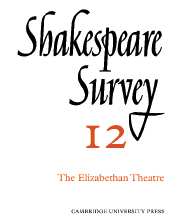Book contents
- Frontmatter
- The Open Stage: Elizabethan or Existentialist?
- The Lantern of Taste
- Was there a Typical Elizabethan Stage?
- On Reconstructing a Practicable Elizabethan Public Playhouse
- The Discovery-space in Shakespeare’s Globe
- ‘Passing over the Stage’
- The Actor at the Foot of Shakespeare’s Platform
- Elizabethan Stage-Practice and the Transmutation of Source Material by the Dramatists
- The Maddermarket Theatre and the Playing of Shakespeare
- Actors and Scholars: A View of Shakespeare in the Modern Theatre
- Cleopatra as Isis
- Shakespeare’s Friends: Hathaways and Burmans at Shottery
- Illustrations of Social Life II: A Butcher and some Social Pests
- International Notes
- Shakespeare Productions in the United Kingdom: 1957
- The Whirligig of Time, A Review of Recent Productions
- The Year's Contributions to Shakespearian Study 1 Critical Studies
- 2 Shakespeare’s Life, Times and Stage
- 3 Textual Studies
- Books Received
- Index
- Plate Section
The Open Stage: Elizabethan or Existentialist?
Published online by Cambridge University Press: 28 March 2007
- Frontmatter
- The Open Stage: Elizabethan or Existentialist?
- The Lantern of Taste
- Was there a Typical Elizabethan Stage?
- On Reconstructing a Practicable Elizabethan Public Playhouse
- The Discovery-space in Shakespeare’s Globe
- ‘Passing over the Stage’
- The Actor at the Foot of Shakespeare’s Platform
- Elizabethan Stage-Practice and the Transmutation of Source Material by the Dramatists
- The Maddermarket Theatre and the Playing of Shakespeare
- Actors and Scholars: A View of Shakespeare in the Modern Theatre
- Cleopatra as Isis
- Shakespeare’s Friends: Hathaways and Burmans at Shottery
- Illustrations of Social Life II: A Butcher and some Social Pests
- International Notes
- Shakespeare Productions in the United Kingdom: 1957
- The Whirligig of Time, A Review of Recent Productions
- The Year's Contributions to Shakespearian Study 1 Critical Studies
- 2 Shakespeare’s Life, Times and Stage
- 3 Textual Studies
- Books Received
- Index
- Plate Section
Summary
Stage scenery—the visible image of the solid fabric of the universe—seems to be going out of fashion. The existentialist avant garde no longer see the universe as solid. The lone barren tree in Waiting for Godot—the one reminder of an objective world—is not substantial enough for a man to hang himself on. Williams’ hot tin roof is a platform projecting into the audience’s lap, with Brick, Big Daddy, and the Cat caught up in the glaring searchlight of a criminal investigation, with no walls around them and only insubstantial suggestions of ceiling and light shutters. Their souls are bare, perforce; there is nowhere even their faces could hide. Anouilh’s Joan of The Lark, and the characters of Berthold Brecht, are living in no more substantial a world than the characters of Saroyan—they are demonstrations of an idea pieced together of fragments taken from many places and times. Hence they need only fragments for their settings. The arena stage, where ordinary plays are stripped bare, is the latest fashion.
The new way to play old plays is to put them on a bare open stage, with little or no setting. Hamlet at Stratford, Moliere's Don Juan in Paris, Wagner's men and gods at Bayreuth, stand alone in spotlights or surrounded by phantoms of the mind. Black cloth creates a great formless void out of which the characters suddenly appear from nowhere, play their moment, and disappear into nothingness again. Is this just bringing old plays up to date? Or is it a return to the great open platform of Shakespeare's theatre? Is this a rediscovery of the one true way that the great ages have always produced plays, free from the ornamental trappings of baroque scenery? Leslie Hotson declares that the Shakespearian stage was the same kind of open arena stage surrounded by audience on four sides that we know. Modern arena productions have merely opened our eyes to the fact that this is the only great way to play. Richard Southern is bringing out books on the open stage in medieval and modern times. Alfred Harbage insists that we are recovering the true Shakespearian stage when we put the actor before the audience without the distraction of scenery. When he saw Jean Vilar present Moliere and Shakespeare in Paris on an open platform, backed by solid black, he felt that at last the true stage had been found. Yet, tempting as it is to identify the past with the present, the analogy will not hold. The Shakespearian stage was not a blank open platform, on which a lonely soul was spotlighted in an empty, insubstantial universe. We have not returned to the Shakespearian stage, but have invented a new
- Type
- Chapter
- Information
- Shakespeare Survey , pp. 1 - 7Publisher: Cambridge University PressPrint publication year: 1959



